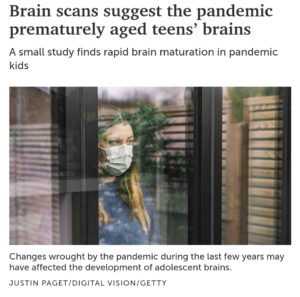According to brain scans, the pandemic prematurely aged the brains of teenagers.

A small study discovered rapid brain maturation in pandemic children.
Teens’ brains may have matured beyond their years as a result of the COVID-19 pandemic.
The last few years have been difficult for young people, from online education and social isolation to economic hardship and an increasing death toll. For teenagers, the pandemic and its numerous side effects occurred during a critical period in brain development.
According to scientists, a small study comparing brain scans of young people prior to and after 2020 uncovers that the brains of teens who resided through the global epidemic look about three decades older than anticipated.
This study, published on December 1 in Biological Psychiatry: Global Open Science, is the first to examine the pandemic’s impact on brain ageing.
The discovery demonstrates that “the pandemic hasn’t been bad just in terms of mental health for adolescents,” according to Ian Gotlib, a clinical neuroscientist at Stanford University. “It appears to have also altered their brains.”
Lockdown orders issued in the spring of 2020 forced the researchers to halt their work. When they resumed a year later, Gotlib was concerned that the stress of the pandemic would skew their results.
It was discovered that the children who returned to the study after a year of pandemic life had higher rates of anxiety and depression than their peers from before 2020. As a result, the team decided to compare brain scans taken before the pandemic began with scans taken between October 2020 and March 2022.
The researchers examined differences in 64 scans from each group, which were matched by the kids’ gender and age, with an average age of around 16 for each group.
The results were “striking,” according to Gotlib.
The hippocampus, which is involved in memory and concentration, and the amygdala, which regulates emotional processing, naturally thicken during adolescent brain maturation. At the same time, the cortex, which regulates emotional functioning, begins to thin.
The brain scans revealed that this maturation process was accelerated in teens who had survived the pandemic. According to Gotlib, their brains appeared three to four years older than the brains of the teens scanned before the pandemic began.
It’s unclear what aspect of the pandemic shaped teen brains. However, “this study shows that the pandemic had a material impact on brain maturation,” says Joan Luby, a child psychiatrist at Washington University School of Medicine in St. Louis who was not involved in the study.
However, it is unclear what caused the changes and what consequences they may have. Other factors, such as increased screen time due to online schooling, could be at work, according to Rudolf Uher, a neuroscientist at Dalhousie University in Halifax, Canada. He also warns that future research may not support the findings of this study.
